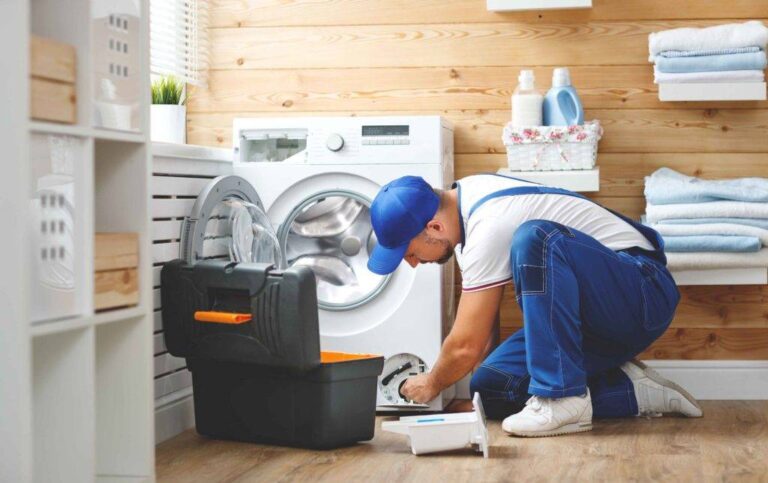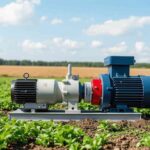Let’s talk about something we all deal with but nobody wants to think about until it happens – appliance breakdowns.
You know what I’m talking about.
That moment when your fridge stops cooling in the middle of July, or your washing machine starts making that weird thumping noise right when you’ve got a pile of laundry to do.
Understanding Clermont’s Climate Impact on Appliances
Living in Clermont means dealing with that Florida heat and humidity, which can be pretty rough on your home appliances.
Unlike folks up north, we’ve got special challenges here.
That sticky humidity? It’s not just making you uncomfortable – it’s also affecting your refrigerator, forcing it to work harder to keep things cool.
Your appliances are basically fighting against our climate every single day of the year.
You’ve probably noticed that metal components rust faster here than in drier places.
That’s not your imagination! The combination of high humidity and salt in our air (even this far inland) speeds up corrosion.
It’s why your washer might develop rust spots or your outdoor grill looks years older than it actually is.
And those summer thunderstorms? Each lightning strike near your home creates power surges that slowly damage electronic components in your smart appliances.
It’s like giving them tiny electric shocks over and over.
The good news? Simple steps like keeping appliances clean, using dehumidifiers in your home, and installing quality surge protectors can add years to your appliances’ lives.
Think of it as sunscreen for your expensive machines!
The Top Appliances Most Likely to Break Down
Let’s get real about which appliances are gonna give you headaches in Clermont.
First up, refrigerators and freezers.
They run 24/7 in our heat, and those compressors just wear out faster here.
Watch for warning signs like strange noises, inconsistent cooling, or frost buildup.
Air conditioners are another big one.
No surprise there! They work overtime about 9 months of the year. The most common issues? Clogged drain lines from all our humidity and worn-out capacitors from the heat.
Washing machines take a beating in Clermont homes too.
Our water has more minerals than in many parts of the country, which causes buildup in the pipes and sensors.
If your washer starts taking forever to fill or drain, that might be why.
Dishwashers struggle with the same water issues.
Plus, running them during afternoon thunderstorms puts them at risk from power flickers that can fry control boards.
Microwaves and ovens often fail because of ventilation problems.
In our humid climate, proper ventilation is super important but often overlooked.
Poor airflow leads to overheating and premature breakdowns.
Appliance repair Clermont technicians can diagnose these issues quickly because they see these same patterns all the time.
They know exactly what to look for in our specific climate.
Safety First: Precautions Before Any Repair
Listen up because this part matters more than anything else.
Before you even think about fixing an appliance, you gotta play it safe.
Always unplug the appliance or flip the circuit breaker off.
Don’t just trust the power switch.
I can’t tell you how many people get shocked because they thought the appliance was off when it wasn’t.
Got kids or pets? Keep them away from your work area. Not just for their safety, but so you can focus without distractions.
When working with gas appliances, if you smell gas, stop everything.
Get everyone out of the house and call the gas company right away.
Gas leaks are nothing to mess around with.
Keep a fire extinguisher nearby.
Not the one that’s been sitting in your garage for 10 years.
Make sure it’s working and you know how to use it.
Wear the right gear. Rubber-soled shoes can prevent electrical shocks.
Safety glasses protect your eyes from flying parts or cleaning chemicals.
Be extra careful with water-using appliances.
Water and electricity are a dangerous mix, especially in our humid climate where things don’t dry out as quickly.
And one last thing – know your limits.
Some repairs are just better left to professionals, especially anything involving sealed refrigeration systems or gas lines.
DIY Troubleshooting Tips Every Homeowner Should Know
You don’t need to be a repair genius to figure out what’s wrong with your appliances.
Try these simple checks before calling anyone.
For refrigerators running warm, check if the coils are dusty.
They’re usually on the back or underneath, and when they’re caked with dust, your fridge works twice as hard.
Vacuum them every few months.
Is your dryer taking forever? Clean that lint trap completely and check the vent hose.
In Florida’s humid air, lint gets sticky and builds up fast, creating a fire hazard and making your dryer inefficient.
Dishwasher not cleaning right? Look at the spray arms for clogs.
Our water can leave mineral deposits that block water flow.
A toothpick works great to clean those tiny holes.
For washing machines that won’t drain, check the drain hose for kinks and clean the pump filter.
You wouldn’t believe the stuff that gets trapped in there – coins, bobby pins, even small toys.
When your microwave stops heating, check if the door switches are working.
They’re a common failure point and sometimes just need cleaning.
AC not cooling? Make sure the outdoor unit isn’t choked with leaves or debris.
Our Florida trees drop stuff year-round that can block airflow.
Remember that weird noises usually mean something’s loose or worn out.
Grinding sounds are never normal and mean you should stop using the appliance until it’s fixed.
When to Repair vs. Replace
This is the big question that stumps most homeowners.
Here’s how to make that call without overthinking it.
First, think about the age of your appliance.
Most refrigerators last about 13 years, washers and dryers about 10, dishwashers maybe 9.
If you’re near those numbers, replacement often makes more sense.
Then there’s the 50% rule.
If a repair costs more than half of a new appliance, you’re usually better off replacing it.
The math just works out better in the long run.
Consider energy efficiency too.
Newer models use way less electricity than ones from even 10 years ago.
In Clermont’s climate, where your AC and refrigerator run almost constantly, those savings add up fast.
Availability of parts matters too.
Some brands are harder to find parts for, especially older models.
If your repair person has to hunt down parts, that’s a sign replacement might be smarter.
Think about reliability.
If this is the third time your ice maker has broken in two years, it’s telling you something.
Some problems just keep coming back.
Don’t forget about home sales.
If you’re planning to sell soon, new appliances can boost your home’s appeal, especially in Clermont’s competitive market.
Trust your gut too.
If you’re constantly worried about when that washing machine is going to flood your laundry room again, the peace of mind from a replacement might be worth every penny.
Finding Reliable Local Appliance Repair Pros in Clermont
Finding someone good to fix your appliances in Clermont isn’t as simple as picking the first name that pops up online.
Here’s how to find someone who won’t waste your time or money.
Ask your neighbors first.
Nextdoor and community Facebook groups are gold mines for recommendations.
People love sharing both good and bad experiences.
Check for proper licensing. Florida requires professional licensing for appliance repairs.
Ask for their license number and verify it online through the Department of Business and Professional Regulation.
Look for specialists in your type of appliance.
Someone who mainly fixes refrigeration equipment might not be the best choice for your washing machine problem.
Read reviews carefully. Look for patterns in what people say, not just star ratings.
Are they consistently praised for being on time? For fair pricing? For explaining problems clearly?
Ask about warranties on their work.
Good repair pros stand behind their fixes with at least a 90-day warranty, sometimes longer on parts they install.
Consider response time.
In our hot climate, waiting days for a refrigerator repair isn’t practical. Ask upfront how quickly they can get to you.
Don’t just go with the lowest quote.
Super low prices sometimes mean cutting corners or using inferior parts.
Good repair work isn’t cheap, but it’s cheaper than having to do the same repair twice.
Average Repair Costs in Clermont
Let’s talk about money. Knowing what repairs typically cost helps you budget and avoid getting overcharged.
For refrigerator repairs, expect to pay between $200 and $400 in the Clermont area.
Replacing a compressor will push that higher, closer to $500-$700.
Washing machine fixes usually run $150 to $300.
Pump replacements are on the lower end, control board issues on the higher end.
Dishwasher repairs typically cost $150 to $250.
Motor problems cost more, while simpler issues like replacing a door latch or soap dispenser cost less.
Dryer repairs average $150 to $275 in our area.
Heating element replacements are common and fall in the middle of that range.
Oven and range repairs can vary widely, from $100 for a simple igniter replacement to $350+ for control panel issues.
Microwave repairs typically run $100 to $200, but if it’s a built-in model, installation labor can add to that cost.
Remember that service call fees in Clermont typically range from $75 to $100 just for the diagnosis, which is sometimes applied toward the repair if you move forward.
Holiday and weekend emergency service can add 25-50% to these costs, so if it’s not an emergency, waiting until regular business hours saves money.
Preventative Maintenance for Long-Lasting Appliances
A little regular care goes a long way toward preventing those expensive emergency repairs.
Clean your refrigerator coils every 3-4 months.
In our dusty Florida environment, they get dirty faster than you’d think.
This simple step can prevent overheating and extend compressor life.
Run your dishwasher weekly even if it’s not full.
Long periods of sitting unused can cause seals to dry out and crack in our climate.
Clean your washing machine monthly with a specialized cleaner or vinegar cycle.
Our water leaves mineral deposits that can clog hoses and sensors over time.
Check and clean your dryer vent at least twice a year.
Our humid air makes lint stick together, creating dangerous clogs that reduce efficiency and create fire hazards.
Keep outdoor AC units clear of plants and debris.
Leave at least 2 feet of clearance all around for proper airflow.
Avoid overloading appliances.
Stuffing too many clothes in your washer or too many dishes in your dishwasher makes motors work harder and wear out faster.
Consider using water softeners if you have hard water.
They’re not just for drinking water – they protect all your water-using appliances from mineral buildup.
Warranty and Insurance Considerations
Understanding your coverage options can save you serious money when things go wrong.
Manufacturer warranties typically last 1 year, but always register your appliance to activate it.
Some brands offer longer coverage on specific parts like motors or compressors.
Extended warranties make the most sense for high-end appliances with lots of electronic components.
They’re usually not worth it for basic models with mechanical controls.
Check your home insurance policy.
Some cover appliance damage from power surges or lightning strikes, which happen regularly in Clermont during storm season.
Home warranty plans can be valuable if you have multiple aging appliances.
They typically cost $400-600 yearly in our area but cover most major repairs with just a service call fee.
Keep all your receipts and warranty paperwork in one place.
A simple folder or digital file makes claims much easier when something breaks.
Know that moving an appliance yourself might void its warranty.
Always check the fine print before relocating equipment.
Some credit cards automatically extend manufacturer warranties when you purchase with them. Check your card benefits – you might have coverage you don’t know about!
Energy Efficiency Tips for Clermont Homes
Making your appliances more efficient isn’t just good for the planet – it’s good for your wallet too.
Set your refrigerator temperature between 37-40 degrees. Any colder just wastes electricity without preserving food better.
Run your dishwasher and washing machine only when full.
In Clermont’s climate, you’re likely using these appliances more frequently than the national average due to our outdoor lifestyle.
Use your microwave instead of your oven when possible.
It uses about 80% less energy and won’t heat up your kitchen, giving your AC a break.
Clean or replace AC filters monthly.
Our dusty environment clogs filters faster than you might expect, and dirty filters can increase energy use by 15%.
Consider smart power strips for entertainment centers and home office setups.
They prevent “vampire power” drain from devices in standby mode.
Use ceiling fans along with AC.
They let you raise the thermostat by 4 degrees with no loss in comfort, saving significant cooling costs in our hot climate.
Schedule appliance use for off-peak hours when possible.
Running your dishwasher after 9 PM can sometimes qualify for lower electricity rates depending on your provider.
Conclusion
Taking care of your appliances in Clermont means understanding how our unique climate affects them.
With the right maintenance and a good relationship with a trustworthy repair service, you can avoid those major headaches and expenses that come with unexpected breakdowns.
Remember that prevention is always cheaper than repair, and repair is usually cheaper than replacement.
A little attention now saves a lot of money later.
Stay cool, Clermont friends! Your appliances will thank you.



